
Mayo Clinic
Medical Editor Jamie M. Bogle, Au.D., Ph.D.
Publisher Daniel J. Harke
Editor in Chief Nina E. Wiener
Managing Editor Stephanie K. Vaughan
Art Director Stewart J. Koski
Production Design Darren L. Wendt
Illustration and Photography Mayo Clinic Media Support Services, Mayo Clinic Medical Illustration and Animation
Editorial Research Librarians Abbie Y. Brown, Edward (Eddy) S. Morrow Jr., Erika A. Riggin, Katherine (Katie) J. Warner
Copy Editors Miranda M. Attlesey, Donna L. Hanson, Nancy J. Jacoby, Julie M. Maas
Indexer Carol Roberts
Contributors Aleta K. Capelle; Michael J. Cevette, Ph.D.; Nicholas L. Deep, M.D.; Omolola O. Famuyide, P.T., D.P.T.; Adam M. Goulson, Au.D.; Cynthia A. Hogan, Ph.D.; Sarah (Sarah Oakley) O. Holbert, C.C.C.-A; Elaine D. JohnsonSiekmann, P.T., D.P.T.; Brian H. Kaihoi; Jon R. (Joey) Keillor; Amanda J. Knapp; Heather L. LaBruna; Giau N. Le, Au.D., C.C.C.-A.; Devin L. McCaslin, Ph.D.; Gayla L. Poling, Ph.D.; Manami H. Shah; Helga I. Smars, P.T.; Greta C. Stamper, Au.D., Ph.D.; Peter A. Weisskopf, M.D.; David A. Zapala, Ph.D.
We acknowledge with gratitude the individuals and families who shared their experiences with hearing loss and balance issues in this book: Teresa Bowers; Judith Collins; Lexi Grafe; Ken Larson; Matt, Melinda, and Aida Little; Scott Malmstrom; Julie Metternich Olson; Sue Sherek; Joyce Sherman; and Greta Stamper. Additional gratitude goes to Matthew L. Carlson, M.D.; Colin L. W. Driscoll, M.D.; Lori E. Hubka; Terra M. Paulson; and Colleen D. Young for their support in developing the personal stories in this book.
Published by Mayo Clinic Press
2022 Mayo Foundation for Medical Education and Research (MFMER)
MAYO, MAYO CLINIC and the Mayo triple-shield logo are marks of Mayo Foundation for Medical Education and Research. All rights reserved. No part of this book may be reproduced, stored in a retrieval system, or transmitted, in any form or by any means, electronic, mechanical, photocopying, recording or otherwise, without the prior written permission of the publisher.
The information in this book is true and complete to the best of our knowledge. This book is intended only as an informative guide for those wishing to learn more about health issues. It is not intended to replace, countermand or conflict with advice given to you by your own physician. The ultimate decision concerning your care should be made between you and your doctor. Information in this book is offered with no guarantees. The author and publisher disclaim all liability in connection with the use of this book.
For bulk sales to employers, member groups and health-related companies, contact Mayo Clinic, 200 First St. SW, Rochester, MN 55905, or send an email to .
ISBN 978-0-795353-23-9
Library of Congress Control Number: 2021942614
Some images within this content were created prior to the COVID-19 pandemic and do not demonstrate proper pandemic protocols. Please follow all recommended CDC guidelines for masking and social distancing.
Contents
Preface
Hearing allows you to have meaningful conversations and experience the world around you. A solid sense of balance helps you feel steady and confident when you move. When theyre in good working order, your ears provide what you need for both hearing and balance.
Problems with your ears, whether theyre related to hearing, balance or both, can chip away at your self-confidence, affect how well you communicate, and make life less enjoyable overall.
If youre having trouble hearing, you may feel uncomfortable in social situations. You may feel frustrated as you try to go about your day. You may find it easier to withdraw from others. People may see you as timid or disconnected and give up trying to communicate with you.
Likewise, dizziness and balance issues can cause their own variety of struggles. When youre walking, transitioning from a sidewalk to grass may be difficult. It may be hard to get out of bed in the middle of the night without stumbling. Dizziness and balance problems can make it more likely that youll fall and get seriously injured, and your fear of falling may keep you from leaving your home to interact with others. Issues with balance and dizziness can have a number of different causes, and problems with the ears are among them.
In the chapters that follow, youll learn how your ears are connected to hearing loss and balance disorders. Youll also learn what role you can play in living well with and even preventing hearing loss and balance disorders.
Jamie M. Bogle, Au.D., Ph.D.
 Jamie M. Bogle, Au.D., Ph.D.,
Jamie M. Bogle, Au.D., Ph.D., is a Mayo Clinic audiologist who specializes in evaluating children and adults with dizziness and imbalance issues. She is the chair of the Division of Audiology in the Department of Otolaryngology (ENT)/Head and Neck Surgery at Mayo Clinic in Scottsdale and Phoenix, Ariz., and an assistant professor of audiology at the Mayo Clinic College of Medicine and Science. Dr. Bogle also serves as associate editor for the
American Journal of Audiology and has authored numerous scientific papers and addressed many hearing- and balance-related topics as an instructor and guest lecturer.
Are you experiencing hearing loss?
The following questions are based on guidance from the National Institute on Deafness and Other Communication Disorders. These questions can help you decide whether to make an appointment with your doctor or a hearing specialist.
- Do you have trouble hearing on the telephone?
- Do you have to strain to understand conversations?
- Do you have trouble following a conversation when two or more people are talking at the same time?
- Do you have trouble hearing in a situation with a noisy background?
- Do people say that you turn the TV volume up too high?
- Do you find yourself asking people to repeat themselves?
- Do many people you talk to seem to mumble or not speak clearly?
- Do people get annoyed because you misunderstand what they say?
- Do you respond inappropriately to what people say?
- Do you have trouble understanding people who have high-pitched voices or are soft-spoken often women and children?
If you answered yes to three or more of these questions, ask someone who knows you well to consider these questions with you in mind. He or she might notice signs of hearing loss in you long before you do and prompt you to get help. From there, consider asking your doctor about having a hearing evaluation.
Are you experiencing imbalance or dizziness?
The following questions are based on guidance from the National Institute on Deafness and Other Communication Disorders. These questions can help you decide whether to make an appointment with your doctor or a balance specialist.
- Do you feel unsteady?
- Do you feel like the room is spinning around you, even for a moment?
- Do you feel like youre moving when youre sitting still?
- Have you lost your balance or fallen?
- Do you feel like youre falling?
- Do you feel lightheaded or as if you might faint?
- Is your vision blurry?
- Do you feel disoriented or lose your sense of location?
Next page
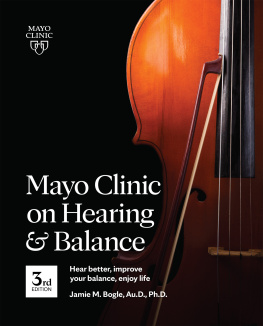
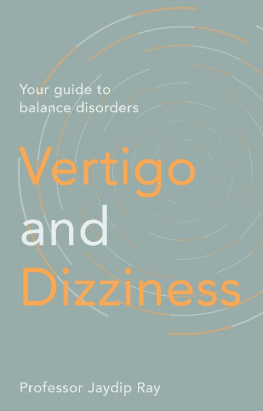
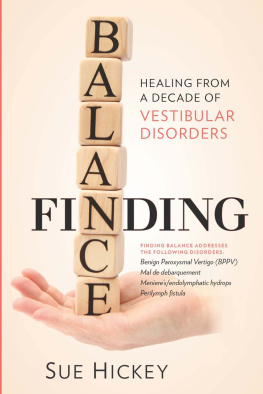
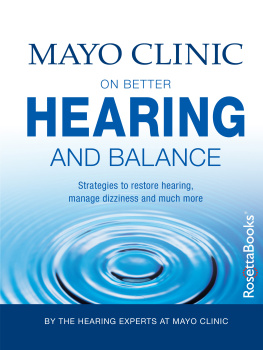
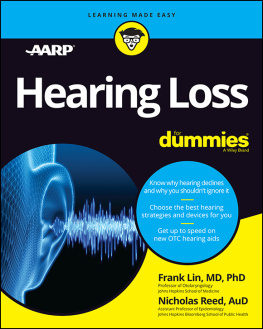
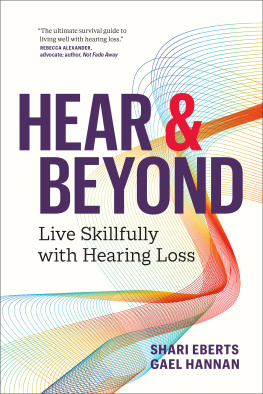

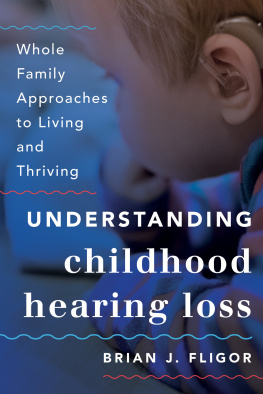

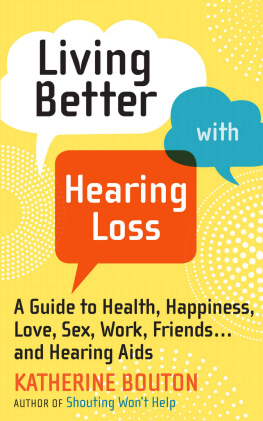


 Jamie M. Bogle, Au.D., Ph.D., is a Mayo Clinic audiologist who specializes in evaluating children and adults with dizziness and imbalance issues. She is the chair of the Division of Audiology in the Department of Otolaryngology (ENT)/Head and Neck Surgery at Mayo Clinic in Scottsdale and Phoenix, Ariz., and an assistant professor of audiology at the Mayo Clinic College of Medicine and Science. Dr. Bogle also serves as associate editor for the American Journal of Audiology and has authored numerous scientific papers and addressed many hearing- and balance-related topics as an instructor and guest lecturer.
Jamie M. Bogle, Au.D., Ph.D., is a Mayo Clinic audiologist who specializes in evaluating children and adults with dizziness and imbalance issues. She is the chair of the Division of Audiology in the Department of Otolaryngology (ENT)/Head and Neck Surgery at Mayo Clinic in Scottsdale and Phoenix, Ariz., and an assistant professor of audiology at the Mayo Clinic College of Medicine and Science. Dr. Bogle also serves as associate editor for the American Journal of Audiology and has authored numerous scientific papers and addressed many hearing- and balance-related topics as an instructor and guest lecturer.